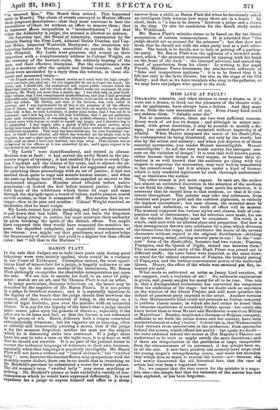MISS LIND AT FAULT
DRAMATIC concerts, and other devices to treat a drama as if it were not a drama, to fetch out the pleasures of the theatre with- out its appliances, have always been a failure. And they must be so, from the very necessities of art. Even Jenny Lind could
not redeem them. Saladin must die."
Not to mention others, there are two Very sufficient reasons. Every work of art has its design ; and although in minor inci- dents, with great discretion, it may be possible to modify a de- sign, you cannot deprive it of essentials without depriving it of vitality. When Mozart composed the music of his Znuberfiite, he contemplated its being illustrated, not only by the words, but also by the action and scenery; and when you deprive it of those essential accessories, you render Mozart unintelligible. Mozart unintelligible! do not the very words convey the strongest cen- sure on the violation of design ? It is true that well-known pieces, either because their design is very simple, or because their si- tuation is so well known that the audience go along with the singers in supposing the accessories, may very well be transferred to the concert-room ; but it is always under a kind of licence, which is only rendered legitimate by such thorough understand- ing as vindicates the author.
The other reason is yet more cogent. In each art, the author has almost an unlimited discretion in the selection of the medium to set forth his ideas ; but having once made his selection, it is necessary that he should keep to that medium, so that it be con- sistent throughout. The painter may take any substance, from charcoal and paper to gold and the costliest pigments, to embody the highest conceptions ; but once chosen, the material must be unmixed and unbroken, or the truth of effect will be marred., The musical composer has various styles and classes, both of cora-. position and of instruments; but his selection once made, his use of the vehicles for thought must be consistent. His work is a whole, each part with its allotted place and proportion. But how is that arrangement thrown into confusion by a plan which divorces the drama from the stage, and distributes the music of the several characters without regard to the original distribution—dividing one part among many, uniting several parts in one I In the " con- cert ' form of the' Saraatro had two voices; Pamina, Papagena, and the Queen of Night, shared one between them •! The solemn sustained unity of the High Priest was pieced out in different stuffs ; the same tones were required, in the same hour, to stand for the refined expression of Pamina, the homely jesting of Papagena, and the strange supernatural power of the nocturnal Queen. Hence, the effect of the whole wanntraineil pt. Rattle- boured yet cold.
What made so cultivated an artist as Jenny Lind sanction, ifs not suggest, such a violation of art ? No authentic explanation is given, and gossip assigns too many for all to be true. One tale is, that a distinguished ecclesiastic has converted the songstress from the sinfulness of the stage : but we doubt such an aspersion on the wisdom of the liberal Prelate, and still more question the default of generous piety imputed to the artist. Another surmise is that Mademoiselle Lind could not persuade an Italian company to perform classic music, in which she had rather be heard than in tiresome repetitions of secondary Italian operas : but surely she knew better than to treat Mozart and Beethoven worse than Bellini or Mayerbeer ? Besides, might not a German or Belgian company, sufficient to set forth the prima donna and her context, have been mustered almost at a day's notice? A third tale is, that Mademoiselle Lind retreats from associations in the profession, from spectacles behind the scenes, which offend her purity : but again we doubt— the rules enforced behind the scenes at Her Majesty's Theatre are understood to be such as might satisfy the most fastidious4iandi if there are irregularities in the profession at large, inseparable from the circumstances of its personnel, it has always been so, in all the arts. A new-born prudery can scarcely have crept over the young singer's strengthening years, and made her abandon that which does so much to redeem the world—art—because she had newly discovered the old historical fact, that the race of artists has ever been a vagabond race.
No; we suspect that the true reason for the mistake is a nega- tive one—the simple fact that the rationale of the matter has not been explored, or has been forgotten.


























 Previous page
Previous page